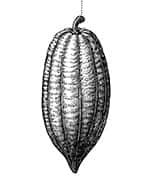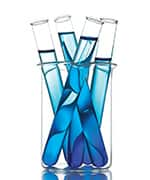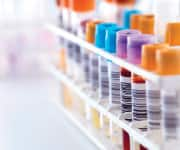Life Extension Magazine®
Men worry that low testosterone will decrease muscle growth and libido.
This is just the tip of iceberg.
Research indicates that low testosterone may affect mood and cause depression.1
It is also linked to an increased risk for heart disease and greater risk of death from any cause.2-7
Serum testosterone declines over time. Beginning as early as age 30, testosterone levels start falling about 1% per year.8,9
Scientists have identified plant-derived nutrients that help safely boost production of this hormone.
In one clinical study, a blend of pomegranate and cacao extracts was shown to increase free testosterone as much as 48% in aging men.10
In preclinical studies, the flavonoid luteolin was shown to support testosterone production and reduce its conversion into estrogen.11-14
Declining Free Testosterone
The hormone testosterone is primarily produced in the testicles in men.15,16 It is crucial for normal development of the male reproductive system and impacts the healthy function of organs and tissues throughout the body.
To perform its vital roles, testosterone must be in a “free” or biologically active form to attach to testosterone receptors on various body cells.
However, only about 2% of all circulating testosterone is in this free, unbound form.17 The rest circulates in the blood already bound to proteins.15,18
And, free testosterone declines with age.
Overweight men have a higher risk for low testosterone. That’s because being overweight or obese is associated with increased levels of the enzyme aromatase, which converts testosterone into estrogen.9,19
Dangers of Low Testosterone
As testosterone levels decline with age, men experience well-known low testosterone symptoms. These include diminished sexual desire, erectile dysfunction, fatigue, reduced muscle mass and strength, and loss of youthful well-being.
But the effects go beyond these. Testosterone deficiency in men correlates with a greater risk of:6,7,18,20-24
- Cardiovascular disease,
- Osteoporosis,
- Chronic inflammation,
- Neurodegeneration, including cognitive decline and Alzheimer’s disease,
- Metabolic syndrome and type II diabetes,
- Depression, and
- All-cause mortality.
A misguided fear that testosterone may cause prostate cancer hampered clinical progress for decades. In reality, low testosterone is associated with increased prostate cancer incidence in most studies.25,26
Clearly, there is a critical need to boost free testosterone levels in most aging men.
Promising Plant Extracts
Seeking a safe and drug-free way to elevate testosterone, scientists took note of a study presented at an endocrinology conference a decade ago.
In that study, healthy men and women who took pomegranate juice for just two weeks increased salivary testosterone levels by 23%-27%. Mood and well-being measures also improved.27
After screening hundreds of plant extracts, scientists believed that both pomegranate and cacao seed extract, from the beans used to make cocoa and chocolate, might promote higher testosterone levels.
A study using testes cells from mice confirmed that both extracts could significantly raise testosterone production.28
In a rodent model, investigators found that a pomegranate-cacao seed combination boosted testosterone production by over 72% in just six weeks.29
Boosting Testosterone in Men
To evaluate pomegranate and cacao extracts in humans, scientists gave men ranging from 36 to 55 years old either a combination of these extracts or a placebo.10
After eight weeks, free testosterone levels in men receiving 400 mg of the pomegranate-cacao blend were elevated by over 48% compared to baseline.10
In addition, in men taking the pomegranate-cacao blend:10
- Overall well-being improved,
- Measures of stress dropped by 26%, and
- Hand grip strength increased by almost 25% compared to baseline.
The pomegranate-cacao group also reduced their symptoms on the Aging Males’ Symptoms scale by 19%.10 These symptoms include:30
- Joint pain and muscle aches,
- Excessive sweating,
- Sleep problems and exhaustion,
- Anxiety and irritability,
- Depression and feeling burned out, and
- Decrease in libido and other sexual problems.
A similar study was done on younger men, aged 21 to 35.10
Even in these younger men, a blend of pomegranate and cacao extracts increased free testosterone by 25%. Hand grip strength and the circumference of the upper arm increased as well.10
How Luteolin Helps
Luteolin is a flavonoid found in certain fruits, herbs, and vegetables, including celery, broccoli, parsley, and thyme.
This compound may support higher testosterone production and levels in two ways. Cell and animal studies demonstrate that luteolin:
- Increases an enzyme called StAR (steroidogenic acute regulatory protein), which is required for testosterone production to occur,31 and
- Inhibits the enzyme aromatase, which converts testosterone into estrogen.11,12
A combination of luteolin and pomegranate-cacao extracts may support the production and maintenance of healthy free testosterone levels in men as they age.
What you need to know
Boost Testosterone for Better Health
- Testosterone is crucial to healthy aging in men, but levels of this hormone begin to drop around age 30.
- Low testosterone causes symptoms like fatigue, low libido, and reduced strength. It also increases the risk of cardiovascular disease and other disorders, and raises the risk of death from any cause.
- In clinical studies, a blend of pomegranate and cacao seed extracts increased bioactive free testosterone in men by as much as 48% and improved measures of stress, hand grip strength, and more.
- Preclinical studies show that the flavonoid luteolin may support optimal testosterone levels and maintain healthy testosterone and estrogen balance.
Summary
Beginning around age 30, levels of the hormone testosterone in men begin to decline.
Low testosterone can result in symptoms like erectile dysfunction, fatigue, and reduced muscle mass, and poses a serious risk to overall health.
Pomegranate and cacao seed extracts boost testosterone production. In a clinical study, this combination increased free testosterone by 48% and improved measures of stress-resilience and strength.10
Preclinical data found that the flavonoid luteolin also supports higher testosterone levels.
Together, these nutrients may help aging men support higher testosterone levels and quality of life.
How to Check Your Testosterone Level
The best way to check your testosterone status is through simple blood tests.
In men, the optimal ranges for free and total testosterone in the blood are:
- Free testosterone: 15-25 pg/mL
- Total testosterone: 600-900 ng/dL
If you have any questions on the scientific content of this article, please call a Life Extension Wellness Specialist at 1-866-864-3027.
References
- Nead KT. Androgens and depression: a review and update. Curr Opin Endocrinol Diabetes Obes. 2019 Jun;26(3):175-9.
- Bassil N, Morley JE. Late-life onset hypogonadism: a review. Clin Geriatr Med. 2010 May;26(2):197-222.
- Marin P, Arver S. Androgens and abdominal obesity. Baillieres Clin Endocrinol Metab. 1998 Oct;12(3):441-51.
- Seidell JC, Bjorntorp P, Sjostrom L, et al. Visceral fat accumulation in men is positively associated with insulin, glucose, and C-peptide levels, but negatively with testosterone levels. Metabolism. 1990 Sep;39(9):897-901.
- Travison TG, Morley JE, Araujo AB, et al. The relationship between libido and testosterone levels in aging men. J Clin Endocrinol Metab. 2006 Jul;91(7):2509-13.
- Araujo AB, Dixon JM, Suarez EA, et al. Clinical review: Endogenous testosterone and mortality in men: a systematic review and meta-analysis. J Clin Endocrinol Metab. 2011 Oct;96(10):3007-19.
- Michaud JE, Billups KL, Partin AW. Testosterone and prostate cancer: an evidence-based review of pathogenesis and oncologic risk. Ther Adv Urol. 2015 Dec;7(6):378-87.
- Brawer MK. Testosterone replacement in men with andropause: an overview. Rev Urol. 2004;6 Suppl 6(Suppl 6):S9-S15.
- Kazi M, Geraci SA, Koch CA. Considerations for the diagnosis and treatment of testosterone deficiency in elderly men. Am J Med. 2007 Oct;120(10):835-40.
- Nutraceutical L. Internal Study. A randomized, double blind, placebo controlled study to evaluate the efficacy and safety of a novel herbal composition improving aging males’ symptoms. Data on file. 2018.
- Li F, Wong TY, Lin SM, et al. Coadministrating luteolin minimizes the side effects of the aromatase inhibitor letrozole. J Pharmacol Exp Ther. 2014 Nov;351(2):270-7.
- Lu DF, Yang LJ, Wang F, et al. Inhibitory effect of luteolin on estrogen biosynthesis in human ovarian granulosa cells by suppression of aromatase (CYP19). J Agric Food Chem. 2012 Aug 29;60(34):8411-8.
- Cormier M, Ghouili F, Roumaud P, et al. Influences of flavones on cell viability and cAMP-dependent steroidogenic gene regulation in MA-10 Leydig cells. Cell Biol Toxicol. 2018 Feb;34(1):23-38.
- Martin LJ, Touaibia M. Improvement of Testicular Steroidogenesis Using Flavonoids and Isoflavonoids for Prevention of Late-Onset Male Hypogonadism. Antioxidants (Basel). 2020 Mar 13;9(3).
- Available at: https://www.ncbi.nlm.nih.gov/books/NBK526128/. Accessed October 13, 2022.
- Kohn FM. Testosterone and body functions. Aging Male. 2006 Dec;9(4):183-8.
- Hinson J, Raven P, Chew S. Hormonal Control of Reproduction Part I. In: Hinson J, Raven P, Chew S, editors. The Endocrine System: Churchill Livingstone; 2010:87-98.
- Edwards RZ. Testosterone Deficiency. In: Rakel D, ed. Integrative Medicine: Elsevier; 2018:630-7.e1.
- Kalyani RR, Dobs AS. Androgen deficiency, diabetes, and the metabolic syndrome in men. Curr Opin Endocrinol Diabetes Obes. 2007 Jun;14(3):226-34.
- Zhang X, Zhao H, Horney J, et al. Testosterone Deficiency, Long-Term Testosterone Therapy, and Inflammation. J Cardiovasc Pharmacol Ther. 2021 Nov;26(6):638-47.
- Li Y, Liu M, Cui Y, et al. Increased risk of testosterone deficiency is associated with the systemic immune-inflammation index: a population-based cohort study. Front Endocrinol (Lausanne). 2022 2022-August-16;13:974773.
- Avsar O. Is testosterone perspective available for neurodegenerative diseases? Neuropsychiatry. 2018 01/01;08(05).
- Muraleedharan V, Jones TH. Testosterone and the metabolic syndrome. Ther Adv Endocrinol Metab. 2010 Oct;1(5):207-23.
- Kheirkhah F, Hosseini SR, Hosseini SF, et al. Relationship between testosterone levels and depressive symptoms in older men in Amirkola, Iran. Caspian J Intern Med. 2014 Spring;5(2):65-70.
- Morgentaler A, Rhoden EL. Prevalence of prostate cancer among hypogonadal men with prostate-specific antigen levels of 4.0 ng/mL or less. Urology. 2006 Dec;68(6):1263-7.
- Hoffman MA, DeWolf WC, Morgentaler A. Is low serum free testosterone a marker for high grade prostate cancer? J Urol. 2000 Mar;163(3):824-7.
- Smail N, Al-Dujaili E. Pomegranate juice intake enhances salivary testosterone levels and improves mood and well being in healthy men and women. 2012.
- Nutraceutical L. Laila Nutraceutical Internal Study. Evaluating testosterone production activating capacity of herbal extracts in MA-10 mouse leydig cells. Data on file. 2018.
- Nutraceutical L. Laila Nutraceutical Internal Study. Tesnor raises testosterone levels in rats: in vivo study. Data on file. 2018.
- Moore C, Huebler D, Zimmermann T, et al. The Aging Males’ Symptoms scale (AMS) as outcome measure for treatment of androgen deficiency. Eur Urol. 2004 Jul;46(1):80-7.
- Couture R, Mora N, Al Bittar S, et al. Luteolin modulates gene expression related to steroidogenesis, apoptosis, and stress response in rat LC540 tumor Leydig cells. Cell Biol Toxicol. 2020 Feb;36(1):31-49.






